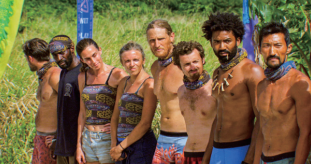Aired from October on Mnet, a hip-hop survival program SHOW ME THE MONEY 10 is currently getting a round of applause. From the 2010s to the present, various survival programs have made people go crazy for them. The idol debut survival series, PRODUCE 101, transformed teenagers into “national producers”, and it seems that even a number of the older generation enjoy survival programs due to the popularity of the talent show Tomorrow Is Mister Trot. However, sensations always come together with controversies. Therefore, the Sungkyun Times (SKT) is going to investigate how survival programs have developed, controversies surrounding them, and how they should move forward.
Survival Programs Until Today
What Is a Survival Program?
A survival program refers to a reality show that features competition among participants under a certain mission. The first real survival program was Survivor, a reality show about surviving on a desert island broadcasted in the United States in 2000. Since then, survival programs have developed into various forms. In Korea, the entertainment show Star Survival Donggeo Dongrak in the latter half of 2000 first introduced the survival format to the public. During the 2010s, western survival content was actively imported by Korean broadcasting companies, and Korea’s Next Top Model is an example of this. In addition, as production skills developed, Korean survival programs such as the brain game survival The Genius even sold their copyrights for export as well. Nowadays, survival programs have made their way to new media, and a new type of survival program has appeared. For example, a survival competition program Money Game, uploaded on YouTube this April, became a hot potato among the younger generations with the highest views of about 9.4 million.

Influence of K-pop on Korean Survival Programs
There have been various types of survival shows in Korea, but among them, talent shows certainly played the biggest role in the prosperity of survival programs. The first Korean audition program was the Superstar K series, and it was a great success, reaching eight seasons. Learning from its success, tons of rip-offs were made in the early 2010s, and people soon got tired of repetitive styles. Later, the PRODUCE 101 series, where idol trainees competed for an idol group debut, has rekindled the fire of survival programs since 2016. The fact that viewers could organize an idol group solely by themselves via public voting, not by judges, successfully attracted young people. The series recorded the highest viewer ratings of 5.4% which is extremely high considering it was being broadcasted on a cable channel. Survival programs based on K-pop are now applied to various fields beyond idol audition programs. Recently, a hip-hop survival program SHOW ME THE MONEY and a street dance survival show Street Woman Fighter have expanded the scope of the K-pop survival program, dealing with various aspects of K-pop.
Controversies Surrounding Survival Programs
Manipulating the Results
Being famous also means that there are many watchful eyes. In particular, survival programs, which determine the result via public voting, have been embroiled in controversy over manipulating the number of votes and the ranking of participants. For example, Korea’s Next Top Model season 4 was blamed for creating an unprecedented consolation match when Jung Ho-yeon, a rookie from a powerful modeling agency, was eliminated earlier than expected. This aroused suspicion whether the program fabricated Jung Ho-yeon’s ranking due to the agency’s influence at the time. Also, the popular PRODUCE 101 series ended with a scandal about fabricating the rankings of participants. Because of the scandal, its producers were sentenced to imprisonment for fraud and business obstruction in March 2021. There are two major problems with manipulation: financial issues and ethical issues. First, people paid to vote for their choice. The court applied fraud to the PRODUCE 101 production team as they lured viewers into paying for votes, saying viewers can directly influence the result, whereas the final outcome was determined in advance. The production staff had made a profit of approximately 80 million won from the votes. Second, it destroys participants’ dreams. Due to ranking fabrication, the competition proceeded in an unfair way. Some predetermined participants got preferential treatment, and this frustrated other participants. Because of the greed of some people who sought financial benefits, those who truly worked hard had to give up on their dreams.

Provocative Editing
In order to make people more immersed in survival programs, producers intentionally make viewers misunderstand the original situation in a negative way by using editing, adding inappropriate subtitles, and adding background music. This is commonly called “devil’s editing”. It initially started in the 2010’s Superstar K season 2 when one participant was edited to seem irrational and selfish, and the participant became a victim of criticism and was eliminated. Since then, malicious editing has been repeatedly used in survival programs, and the term “devil’s editing” has become popular. The biggest problem with devil’s editing is that it leads the victim to receive excessive criticism from the public. As the main content of survival programs is “competition”, it is natural that participants become a little sensitive; producers overemphasize some participants’ behaviors and comments with devil’s editing and create an atmosphere where it seems okay to blame them. For example, in 2012’s Korea’s Next Top Model season 3, supermodel Choi So-ra, who was a participant of the show back then, was reflected as a detestable and annoying character through the devil’s editing. As a result, a middle school student, who was too immersed in the show, scratched Choi So-ra’s face. If the devil’s editing continues, it would be difficult to promote a far evaluation considering that viewers can only judge through edited scenes. In addition, as there is an increasing number of young participants in survival programs, it will be a bigger problem if they become the target of criticism.

For the Better Development of Survival Programs
Efforts to Make a Fair Broadcast
In order for the public to enjoy survival programs more, producers need to create an environment for fair competition. As the first step toward a fair broadcast, producers should create programs that communicate with the audience. Recently, viewers have started recognizing malicious editing and the damaging results to the performers. Therefore, they are no longer swayed by provocative editing, but are insisting “Let’s not be fooled by devil’s editing.” Producers should realize that devil’s editing has limitations to the programs’ popularity and viewers’ ratings, and make efforts to edit in a way the audience requires. In fact, the hip-hop survival program GOOD GIRL, which was broadcasted last year, received negative responses by adding spice to the show with devil’s editing. However, its production staff showed the desirable move, collecting opinions from the viewers and changing the way they edit. After that, the show could receive better responses. By further expanding cases like GOOD GIRL, future survival programs should communicate with viewers mutually.
Expanding to a New Platform
Recently, as more and more people watch broadcasts through mobile devices, the importance of Over the Top (OTT) services such as Netflix and Tving, or video platforms such as YouTube is soaring. In particular, OTT services provide a lot of support for program production as well as broadcasting through their original programs. Survival programs, which are still mostly broadcasted through television, need to be expanded to various platforms in line with the trend. In the case of the aforementioned YouTube survival program Money Game, although it was very popular and groundbreaking, it had various controversies. Since it was produced and broadcasted by a YouTuber, the quality of filming and editing was of a lower quality than that of television broadcasts. If survival programs continue to challenge new fields based on the problems of Money Game, they will be able to make better programs in the future. The OTT original programs are increasingly loved worldwide as they possess high qualities and various themes of programs with strong support from OTT companies. Survival programs, which have endless possibilities in creating program concepts and game rules, will also be able to create programs with high quality if they meet the huge capital of OTT services.

Both in the past and the present, survival programs have provided great entertainment for people. However, if survival programs don’t resolve the various controversies surrounding them, they might no longer be as fun to watch. People will have to keep an eye on the way of survival programs’ development so that they can survive for a long time.
